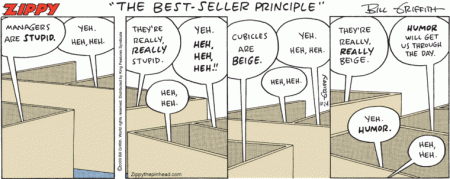From a rodeo queen competitor interviewed on KQED’s “California Report”, October 23:
(1) It’s sort of depressing when you haven’t won many times, again, again.
The intended reading of “you haven’t won many times” is not one in which negation has scope over the quantifier many —
(1a) ‘it’s not the case that you have won many times’
(a reading that mirrors the ordering of the negator and the quantifier in (1) — but one with the quantifier scoping over negation:
(1b) ‘there are many times when you haven’t won’
In fact, (1) might be understood as implicating something stronger than (1b), namely that there aren’t any times when you have won, an understanding that’s encouraged by “again, again”: you keep on failing to win, time after time.
Here’s a case that follows Kilpatrick’s Rule (KR), which prescribes the scoping of a quantifier over negation. KR is so called from James J. Kilpatrick’s insistence that the headline
(2) Mass Transit Not an Option for All Drivers
must mean that mass transit is an option for no drivers (‘for all drivers, mass transit is not an option’), though this is clearly not what the headline writer intended.
Mark Liberman mused on KR on Language Log (here, here, and here), disputing Kilpatrick’s claim, as did Neal Whitman and Jan Freeman. All three writers maintained that wide-scope negation was by far the most natural reading for examples like (2), and Mark provided a pile of examples, from a variety of respected writers over the centuries, in which negation scopes over the quantifier all, and he hadn’t found any examples with the other scoping.
In fact, it’s not hard to find examples with wide-scope negation where the quantifier all precedes (rather than follows) a negative element, as this case from Nicholas Kristof (“More Troops Are A Bad Bet”, NYT op-ed piece of 9/22/09):
… there are some first-rate commanders on the ground who cooperate well with local Pashtun leaders. That creates genuine stability. But all commanders cannot be above average, and a heavier military footprint almost always leads to more casualties, irritation and recruitment for the Taliban.
The reading here is ‘it’s not the case that all commanders can be above average; not all commanders can be above average’, not ‘for all commanders, they cannot be above average; no commanders can be above average’.
But (1) has the quantifier many, not all, and the two quantifiers work somewhat differently. Indeed, the difference between the readings (1a) and (1b) is subtle — even more so for (2′) (cf. (2)):
(2′) Mass Transit Not an Option for Many Drivers
‘not many drivers have mass transit as an option’ or ‘for many drivers, mass transit is not an option’.

